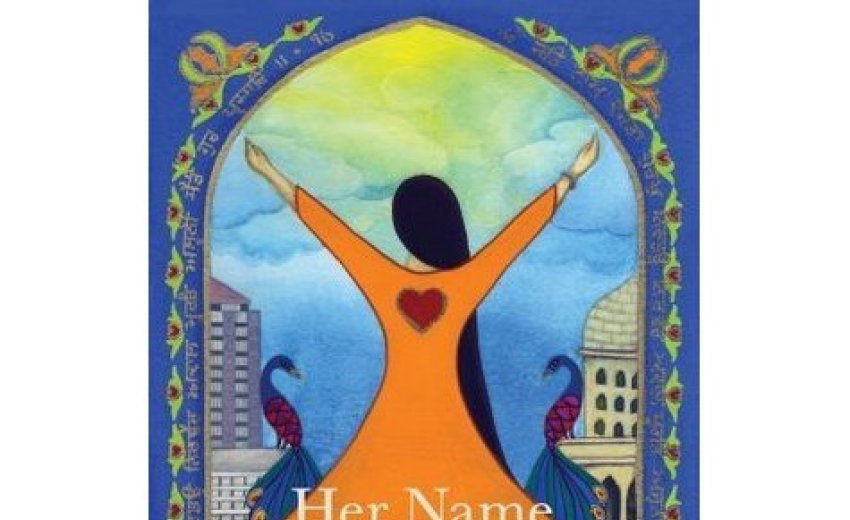Her Name Is Kaur: Sikh American Women Write About Love, Courage, and Faith offers insight into the lives of Sikh women in America. Through its stories it explores the concept of love in many forms: self-love, spiritual love, love within family, romantic love, the love the women nurture for humanity and the world through their professional work, and more. In this excerpt shared by permission, editor Meeta Kaur tells of her own love story.
In late summer 2002, I stood on the steps of a Manhattan apartment building waiting for a man I had yet to meet in person. I had officially met him over IM — an AOL chat set up a month earlier by a mutual friend. Our mutual friend held a firm optimism I’d like this man, even though I had sworn off marriage and was contemplating buying a backpack, taking rock-climbing lessons, and traveling the world. I was determined to be the community Auntie on a consistent global adventure — not a wife and a mom. In spite of myself, however, I was intrigued.
My coast-to-coast blind date began with a charming message in 11-point Geneva font that popped up on my computer screen to say hello every so often. I scoured the Internet for a picture of my IM suitor and found two. In one, he looked sweet and youthful, smiling ear to ear with a peer camp counselor he used to work with at youth camps. The other picture showed an attractive man in a neatly tied turban and beard. Banjot looked like he had knowledge of the world, like my father and uncles.
We talked a few times on the phone. He lived centered in composure, a placid pool of calm. All of it was expressed through his voice, and the pace at which he carried conversations. He naturally slowed me down from my so-called “schedule” and the ways I kept myself busy to not feel so alone in the world. I had good friends and family, but I realized I was looking for a life partner. We decided to meet.
I flew from California to New Jersey for a South Asian Women’s conference. He was in Manhattan. I was on a budget, but I managed to get a cab from to the bus station and then took a Greyhound from Jersey to Manhattan. Had my family known, they would have had the police, the FBI, and a SWAT team looking for me But I knew I could handle myself so I decided to let fate lead me.
He breezed down the steps, tall, latte-skinned, and handsome. He wore a black turban, jeans, and layered over a white T-shirt a light-blue sweater. A hint of a black strap inched its way out from under his T-shirt. It was his gathra, a strap that holds his kirpan, a sacred dagger, in place. It captivated me. I had met people who wore kirpans but never entertained dating a person who wore one. For me, seeing that gathra secured me in the present moment, and the ground beneath me became a little firmer.
I waited patiently for him to say something about it. Break out into a lecture on Sikh awareness or how important it is to be an Amritdhari, a Sikh who volunteers to be initiated into the Khalsa Panth. I waited for him to ask me if I was one, or say that he expected me to be, but he never delivered the lecture. From the very first meeting, he let me be me.
We walked through Central Park, attempting a conversation in broken Punjabi with our American-educated, English-stained tongues. He sang Sting’s “Fields of Gold” to me. There was that voice again. It was deep and calm, like a solitary walk through Muir Woods. His voice could carry warring nations to peace it was so comforting, so reassuring.
…And all the while, his spiritual status never came up — nor did mine. That private world where he prayed was his and his alone. It simply was none of my business. And yet I realized the commitment that gathra represented was something I wanted, too. His spiritual world wasn’t mine to step into; I needed to create my own world centered in faith.
Our future togetherness was something I sensed. None of it was spoken; it wasn’t revealed in a clever chat over coffee; it was in the squeeze of his hand, and the lifetimes I saw in his eyes, which also expressed how much he valued himself, his roots, and his love for the world.
As I saw him more, and spent time with him, I realized we were having a much deeper dialogue. My questioning of the world met with his unspoken faith in it. His reserve equalized my chatter. My heart opened and invited his in. His resolve anchored me in my own spiritual journey. I started to think I could spend my life with this quiet strength, this unwavering faith of a man.
* * *
Meeta Kaur has written for NPR, Hyphen Magazine, Sikh Chic, and Asian Week, and has been awarded the Hedgebrook Residency for fiction and The Elizabeth George grant for fiction. She is the managing editor of the Sikh Love Stories Project, a storytelling project that reveals the inner lives of Sikh American women and men exploring love in revolutionary ways.

